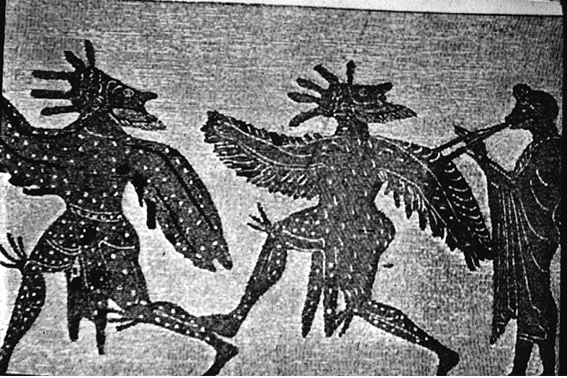
Birds

Aristophanes' methods of audience interaction are:
| DEVICE | EXAMPLES | ANALYSIS |
| ASIDE | GOODHOPE: "Yes, gentleman, I'm sick as a parrot. . . . we want to be as free as the birds, so we've upped and flown our country's coop" (29-35). | Here, Goodhope addresses the audience directly while Makemedo is also onstage in an attempt to summarize the reason for their trip "to the birds." This aside helps the audience understand the basic set-up of the plot before the action really begins. |
| MONOLOGUE | (not applicable) | The chorus does not leave the stage after they enter until the end of the play. Therefore, no monologues occur--excepting perhaps the parabasis, which is essentially a monologue given by the chorus. |
| EAVESDROPPING | (not applicable) | Aristophanes simply does not employ this device in this play. |
| IMPROVISATION |
HOOPOE: "Well, whatever are you, then?" MAKEMEDO: "Eh . . . I'm a Yellow-streaked Dribbler, a Libyan species" (64-65).
|
When Hoopoe's servant investigates Makemedo's claim that he is also a bird, Makemedo invents a title describing the fact that he has just urinated all over himself from fright. This makes the audience feel like the action is unscripted, and so the characters appear more realistic because their actions are influenced by the circumstances, just as the audience members' lives are also. |
| PARABASIS |
1) CHORUS: "Listen, you feeble, faint, and frail humans. . . . You mortals are forlorn, flightless and shadowy forms. . . Birds permeate each and every important aspect of your lives" (685-720). 2) CHORUS: "We would like to take this opprotunity to say a few words to the judges of this dramatic competition. . . . if you should decide not to cast your vote our way, then beware! We would advise you to carry an umbrella at all times . . . the birds will sh*t on you from a very great height!" (1103-17) |
Aristophanes uses the parabasis for two purposes: to extol the superiority of the birds over humans; and to try to win the vote of individual audience members. The parabasis also provides the audience with a break from the dramatic (or comedic) action in addition to giving them a viewpoint to adopt as they watch the play. During the parabasis, the audience is perhaps most closely connected to what is occuring on stage: they are the sole listeners to whatever the chorus leader wants to say. |
| CHORUS | CHORUS: "So let him speak! Let him speak! I'm all in a flap now, I want to hear this big idea" (431-33). | The chorus models the reaction that is desired of the audience, thus giving the audience a link to the show by showing on stage exactly what they're feeling in the audience. |
| ALLUSION |
1) HOOPOE: "That is the yellow-bellied gobbler." MAKEMEDO: "What! There's another besides Cleonymus?" (286-87) 2) MAKEMEDO: "[You birds are] kings more ancient than Cronus, more archaic than the Titans, even older than the Earth!" (466-67) 3) HOOPOE: "You can blame that damned playwright, Sophocles. He did this to me in that dreadful tragedy of his, Tereus" (100-01). |
In the first example, Hoopoe and Makemedo refer to Cleonymus, a well-known Athenian politician, known mostly for his cowardice and obesity. When the audience hears these lines, they feel a connection to the humor and to the mindsets of the characters on stage. The second example draws upon the audience's knowledge of Greek mythology, and in the third example, Aristophanes forces the audience to think about other famous plays. In lines 100-01, Hoopoe explains that he appears as a bird because of Sophocles' play, Tereus. In Tereus, Sophocles writes that Tereus is turned into a Hoopoe as punishment for raping his wife's sister. Whether remembering mythology or other plays, such allusions bring the audience into the action unfolding before them. |
| Aristophanes' Birds | Charlie Chaplin |
| Menander's Old Cantankerous | |
| Plautus' Pseudolus | Alexander Mackendrick's Whiskey Galore! |
go to Conclusions for comparisons and constrasts between works